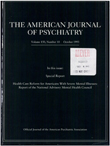Housing instability and homelessness among rural schizophrenic patients
Abstract
OBJECTIVE: The authors examined housing instability among treated schizophrenic patients in a rural area and compared the findings with those from their previous study of urban patients. METHOD: Seventy-five patients with schizophrenia or schizoaffective disorder who were treated in a rural mental health center were assessed with research interviews and ratings by their clinical case managers. The patients were followed for 1 year to identify episodes of psychiatric hospitalization, incarceration, and literal homelessness. RESULTS: Of the 75 patients, 19 (25%) had housing situations characterized as unstable by their case managers. For the majority, housing instability signified tenuousness of living arrangements rather than literal homelessness. Noncompliance with medications, alcohol use, and negative symptoms accounted for 30% of the variance in unstable housing. During follow-up, the unstably housed patients, compared to those in stable living situations, were no more likely to be rehospitalized but were somewhat more likely to be jailed and significantly more likely to be literally homeless. CONCLUSIONS: In the authors' previous study of urban psychiatric patients, unstably housed patients were more likely to be literally homeless, highly symptomatic, and rehospitalized during follow-up than the rural patients with unstable housing. Better outcomes in the rural area appeared to be related to the greater availability of housing alternatives and to intensive case management. For patients with unstable housing in both settings, noncompliance with medications and substance abuse, as well as housing arrangements, should be assertively addressed.
Access content
To read the fulltext, please use one of the options below to sign in or purchase access.- Personal login
- Institutional Login
- Sign in via OpenAthens
- Register for access
-
Please login/register if you wish to pair your device and check access availability.
Not a subscriber?
PsychiatryOnline subscription options offer access to the DSM-5 library, books, journals, CME, and patient resources. This all-in-one virtual library provides psychiatrists and mental health professionals with key resources for diagnosis, treatment, research, and professional development.
Need more help? PsychiatryOnline Customer Service may be reached by emailing [email protected] or by calling 800-368-5777 (in the U.S.) or 703-907-7322 (outside the U.S.).



